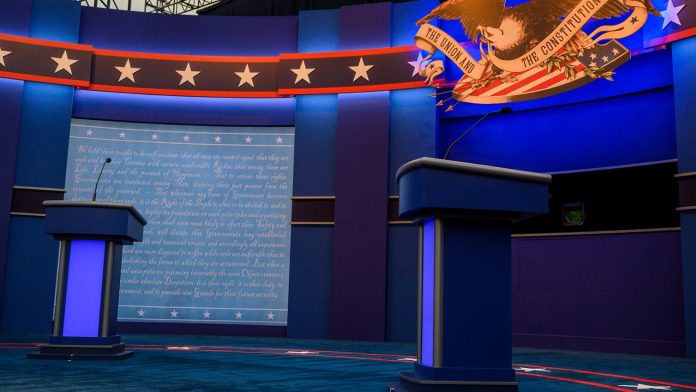How the U.S. Presidential Election Debates Are Organized
U.S. presidential election debates are among the most watched political events in the world. They shape public opinion, influence undecided voters, and often become defining moments of an election cycle.
But how are these debates actually organized? Who sets the rules, chooses the candidates, and controls the format?
This article explains how U.S. presidential debates are structured and managed, step by step, in a clear and easy-to-understand way.
1. What Are U.S. Presidential Election Debates?
Presidential debates are formal public forums where candidates for President of the United States present their policies, answer questions, and directly challenge each other before voters.
They typically occur:
-
During the general election (after party nominees are selected)
-
Occasionally during primary elections (party-specific debates)
General election debates usually attract tens of millions of viewers nationwide.
2. Who Organizes U.S. Presidential Debates?
✅ Independent Debate Organizers
Presidential debates are not run by the government. They are organized by independent, non-partisan organizations or media networks.
Historically, debates have been managed by neutral commissions or coalitions that:
-
Set debate rules
-
Select moderators
-
Coordinate with candidates and media outlets
Their goal is to ensure a fair and balanced platform.
3. Presidential Debates vs Primary Debates
Primary Election Debates
-
Organized by political parties (Democratic or Republican)
-
Used to select party nominees
-
Participation depends on party rules
General Election Debates
-
Feature final presidential nominees
-
Open to national television audiences
-
Considered more formal and structured
✅ Key difference:
Primary debates are partisan; general election debates are neutral.
4. How Candidates Qualify for Presidential Debates
Not every candidate automatically qualifies.
Common qualification requirements:
-
Ballot access in enough states
-
Minimum polling thresholds
-
Legal eligibility (age, citizenship, residency)
These thresholds prevent overcrowding and ensure debates remain meaningful.
5. How Debate Dates and Locations Are Chosen
✅ Dates
Debates are scheduled:
-
After party nominations
-
In the weeks leading up to Election Day
✅ Locations
Debates are held at:
-
Universities
-
Civic centers
-
Public institutions
Locations are rotated geographically to represent different regions of the U.S.
6. Who Chooses the Debate Moderators?
Moderators are selected from:
-
Major national news organizations
-
Veteran journalists
-
Broadcasting networks
Moderator responsibilities:
-
Ask questions
-
Enforce time limits
-
Keep debates civil
-
Prevent rule violations
✅ Moderators must remain neutral and avoid favoring any candidate.
7. Debate Formats Used in U.S. Presidential Elections
Presidential debates use multiple formats:
Traditional podium debate
-
Candidates stand at podiums
-
Moderated Q&A format
Town hall debate
-
Questions from live audience
-
More voter-focused and personal
Seated or discussion format
-
More conversational
-
Used occasionally
Each format aims to highlight different leadership qualities.
8. Rules and Time Limits
Strict rules govern debates.
Typical rules include:
-
Equal speaking time
-
Microphone control
-
No notes or external devices
-
Fixed response durations
-
Rebuttal limits
Any rule changes must usually be agreed upon by both campaigns.
9. How Debate Questions Are Decided
Moderators select questions based on:
-
National priorities
-
Economic issues
-
Foreign policy
-
Healthcare
-
Immigration
-
National security
Questions are not shared in advance to preserve fairness and spontaneity.
10. Role of Media and Broadcasting Networks
Media involvement includes:
-
Broadcasting debates live across networks
-
Providing live fact-checking and analysis
-
Expanding access through online platforms
Presidential debates are typically broadcast commercial-free, emphasizing public interest over profit.
11. Security and Logistics
Presidential debates involve presidential-level security.
Key security elements:
-
Federal and local law enforcement
-
Controlled access for attendees
-
Candidate protection details
-
Secure broadcasting infrastructure
These measures ensure safety for candidates, moderators, and attendees.
12. Why Presidential Debates Matter for Voters
Debates help voters:
-
Compare candidates side by side
-
Evaluate leadership style
-
Assess policy understanding
-
Observe temperament under pressure
For undecided voters, debates can significantly influence voting decisions.
13. Impact of Presidential Debates on Elections
Historical evidence shows debates can:
-
Shift national polling trends
-
Define campaign narratives
-
Highlight strengths or weaknesses
-
Boost or hurt candidate credibility
A single strong or weak debate performance can change the direction of an entire election.
14. Controversies and Criticism
Presidential debates are often criticized for:
-
Limiting third-party candidates
-
Over-emphasizing performance over substance
-
Moderator bias claims
-
Rigid formats restricting discussion
Despite criticism, debates remain a cornerstone of American democracy.
Conclusion: How U.S. Presidential Debates Shape Democracy
U.S. presidential election debates are carefully organized events designed to inform voters, promote transparency, and test candidates under public scrutiny. From qualification rules to moderators and formats, every aspect is structured to ensure fairness and clarity.
Understanding how these debates are organized helps voters engage more thoughtfully in the democratic process and evaluate leaders on substance not just slogans.



